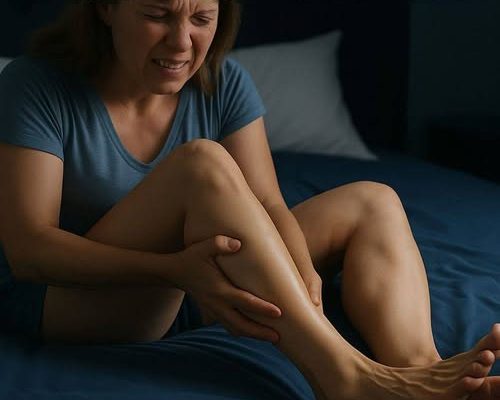Getting up in the middle of the night with a stabbing pain in your leg is more common than you might believe. Millions of people suffer from nighttime leg cramps, which are abrupt, involuntary muscular contractions that occur most commonly in the calves or feet. These cramps, which are frequently dismissed as inconsequential or attributed to aging or dehydration, can occasionally be your body’s way of communicating something more serious.

So, when should you worry?
Occasional cramps are usually harmless
Most midnight leg cramps are harmless. They could result from:
Overuse of muscles over the day might lead to dehydration.
Prolonged standing or sitting.
Sleeping with feet in an odd position.
Electrolyte imbalance (e.g., low magnesium, potassium, calcium)
Pregnancy
Many people experience cramps now and then, which disappear with simple stretching and do not return for weeks. But in certain circumstances, these midnight jolts are more than simply a nuisance
How to Know If Your Leg Cramps Are Serious
Nighttime leg cramps become a medical concern when they reach the following thresholds:
1. Happening Too Often?
If you have leg cramps more than three evenings a week, something may be wrong. Frequent cramping could indicate underlying systemic imbalances, such as poor circulation or nerve problems, especially if it worsens over time.
2. When the Pain Is Intense or Lasts Too Long
Most cramps last from a few seconds to many minutes. However, if you are experiencing severe pain that does not go away, or if the muscle remains tight and uncomfortable for hours thereafter, this could indicate circulatory or neurological issues.
3. When Cramps Start Ruining Your Sleep
Chronic sleep disruptions caused by cramps can result in weariness, irritation, and even melancholy. If cramps are preventing you from getting a good night’s sleep, you should seek medical attention.
4. When Cramps Come With Other Symptoms
Look for these red flags:
- Muscle weakness throughout the day.
- Swelling in your legs or feet
- numbness, tingling, or burning feelings
- Dark or tea-colored urine
- Unexplained tiredness
These could imply conditions like:
- Peripheral Artery Disease (PAD)
- Kidney dysfunction.
- Diabetes causes nerve degeneration (neuropathy).
- Electrolyte imbalances
5. Could Your Medication Be Causing the Cramps?
Some drugs are known to cause leg cramps, particularly
- Diuretics are commonly used to treat excessive blood pressure or heart disease.
- Statins are cholesterol-lowering medicines.
- Beta blockers
- Some asthma treatments
- If your cramps started after you started taking a new medicine, you should see your doctor.
6. How Age and Health Issues Can Trigger Leg Cramps
Leg cramps are more common in older persons, particularly those with chronic medical conditions. If you have diabetes, vascular disease, or thyroid issues, your cramps could be due to more than simply strained muscles.
What’s Really Causing Your Nighttime Leg Cramps?
Here are some of the most prevalent underlying factors:
- Dehydration reduces blood volume and affects neuronal signaling.
- Electrolyte imbalance – A shortage of magnesium, potassium, or calcium interferes with muscular function.
- Muscle cramps can result from poor circulation.

Nerve Compression – Conditions such as spinal stenosis can influence nerve transmissions.
Prolonged inactivity is defined as sitting or sleeping in one position for too long, especially in awkward postures.
Vigorous exercise without sufficient recuperation might cause cramping.
Simple Ways to Prevent Nighttime Leg Cramps
Nighttime leg cramps can be unpredictable and frustrating, but they are often avoided. Small lifestyle modifications and focused habits can significantly reduce their occurrence and intensity. Here’s a closer look at proven strategies to protect your sleep against uncomfortable midnight muscular spasms.
1. The One Bedtime Habit That Can Prevent Leg Cramps
A modest stretching exercise before bedtime will greatly reduce your chances of cramping. Concentrate on the calves, hamstrings, and toes.
Why it works: Stretching lengthens muscle fibers, boosts blood flow, and keeps them supple overnight, especially if you’ve been sitting or sedentary for a long time.
Example routine (2-3 min):
- Calf stretch: Stand with one foot behind the other, front knee bent and back knee straight. Lean on the wall and hold.
- Stretch your hamstrings by sitting on the edge of the bed, extending one leg, and slowly reaching for your toes.
- Ankle circles involve rotating each ankle 10 times in both directions.
2. Hydration is important
Dehydration is one of the most frequent, yet often overlooked, causes of leg cramps.
Tip: Drink plenty of water throughout day, not just at night. Aim for 6-8 glasses of water each day, or more if you exercise or live in a hot region.
Bonus: To help regulate muscle spasms, eat foods high in magnesium or potassium (bananas, avocados, and spinach).
3. Don’t Forget to Refill Your Electrolytes
Muscle cramps can result from low magnesium, potassium, calcium, or sodium levels.
Best sources of electrolytes:
- Magnesium-rich foods include pumpkin seeds, almonds, leafy greens, and dark chocolate.
- Foods high in potassium include bananas, sweet potatoes, and oranges.
- Calcium-rich foods include dairy, tofu, and fortified plant milk.
- Sodium (be careful): sea salt, broth-based soups
If you suspect a deficiency, consider supplements—but always consult your doctor first.
4. Walk During the Day
A sedentary lifestyle? Sit or stand for hours without moving? That can cause your muscles to stiffen and cramp later.
Preventive Habit:
- Walk or stretch every hour.
- If you’re sitting for an extended period of time, shift positions.
- Use a standing desk or footstool to change the leg pressure.
- Walking, swimming, and cycling are all low-impact exercises that maintain good circulation and help decrease overnight cramps.
5. Wear appropriate footwear
Supportive shoes matter more than you might think.
Avoid:
- High Heels
Completely flat shoes.
Worn-out insoles
Use: - Arch-supportive shoes
Cushioned soles.
Orthotic inserts, if recommended.
Bad footwear can strain your muscles all day, resulting in cramps at night.
6. Verify your sleeping position
Surprisingly, the way you sleep can set the stage for cramps.
Avoid:
Sleeping with feet pointed downward (plantar flexion) shortens the calf muscles.
Try this instead:
Maintain your feet in a neutral, flexed position.
To relieve strain, place a pillow beneath your knees or feet.
Consider sleeping on your back with your feet slightly elevated.
7. Massages and warm baths
Warmth relaxes the muscles and increases blood flow.
Try:
A warm bath with Epsom salts before bedtime (high in magnesium).
Apply a heating pad to your legs for 10-15 minutes.
Gently massage your calves with oil or lotion.
Even a few minutes of self-care can help to reduce evening muscle tension.
8. Limit alcohol and caffeine consumption
Both alcohol and coffee can cause dehydration and interfere with deep sleep.
Solution:
Reduce alcohol consumption, particularly in the evening.
To reduce caffeine intake, consider switching to herbal teas at night and drinking a glass of water with each cup.
9. Keep track of your medications
Certain prescription medicines, particularly diuretics, statins, and beta-blockers, have been linked to an increased incidence of cramping.
What To Do:
Never discontinue medications on your own.
Ask your doctor if your prescriptions may be contributing.
If your cramps are chronic and disruptive, look into alternative treatments.
10. Use Magnesium Supplements With Caution
Magnesium is frequently prescribed for leg cramps, particularly in elderly people and pregnant women.
Dosage:
Take 200-400 mg daily, preferably in the evening, under supervision to prevent interactions and unwanted effects.
Some people see relief within days, while others may take many weeks to see results.
You Need To Make Your Muscles Sleep-Ready
To avoid nocturnal leg cramps, prepare your body for rest by staying hydrated, relaxed, and appropriately supported. Making pre-bed stretching and hydrating a regular practice, similar to brushing your teeth, may help you wake up pain-free.
Trending Right Now:
- My Mother-in-Law Tried On My Wedding Dress and Destroyed It — So I Made Her Regret It Publicly
- He Cheated. She Laughed. I Served Them Both a Slideshow of Karma
- “I Overheard My Husband and Our Neighbor’s Daughter — So I Came Up With a Plan She Never Saw Coming”
- He Couldn’t Move, But He Knew Something Was Wrong — So He Looked Up
- I Gave a Ride to a Homeless Man — The Next Morning, Black SUVs Surrounded My Home
- I Married My Former Teacher — But Our Wedding Night Revealed a Secret I Never Saw Coming




